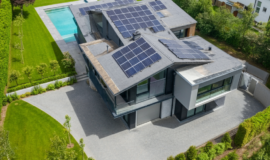Benefits and Limitations of Solar Panels
Solar panels convert light into electricity. Solar – in the sense that – they most of the time capture light from the most powerful source, the sun. While solar energy has become popular and gradually accepted due to the increasing issues in global warming and climate change, solar panels have also gained recognition in the world of solar technology. With this, it is important to know the benefits and limitations of such source of renewable energy.
Benefits of Solar Panels
Clean Energy
Primarily, producing clean energy is what solar panels are good at. Traditional energy sources emit greenhouse gases that are not good for the environment. Solar panels are solutions to these problems. Since, they do not release greenhouse gases, they generate electricity in a clean manner by conducting radiation from the sunlight. Avoiding greenhouse gases would mean reducing the contributing factors to the worsening climate change.
Off grid Electricity to Remote Areas
Homes in remote parts of the world usually have limited access to the main power lines. Installation costs are also typically high. With solar panels, this problem is addressed to as they allow residential houses as well as businesses to tap into electricity off grid. It does not require a connection to the state power lines, hence, it could power properties by exploiting the heat of the sun.
Energy Production Distribution
Traditional energy sources, such as gas, coal and oil, are transported from one country to another in order to meet the people’s need for energy. However, there are costs associated with such transfer. And usually, the costs are high. Aside from monetary expenses, transfer of natural gas, coal and oil also emit carbon emission, thus, contributing to air pollution and global warming. Solar panels avoid these costs by using solar energy anywhere, where transfer of energy sources would not anymore be needed.
Limitations of Solar Panels
High Upfront Costs
One of the drawbacks of using solar panels is that they require high upfront costs. Buying solar panels would be like paying for approximately 25 years of power usage. Aside from the high purchase price, installation cost is also high. To people who are struggling to meet their everyday needs, solar panels may not be a practical option. Nevertheless, studies on solar energy are pursued further to provide the public cheaper and sustainable ways to use solar panels.
Inadequate Storage
Another limitation of using solar panels is the solar batteries. Currently, solar batteries in the market are expensive and bulky. Also, they are only suitable for smaller scale solar panels. While solar energy storage has not yet reach its full potential, developments on innovating adequate solar energy storage are still in progress.
Indeed, solar panel is one of the green technologies that promote a more environment-friendly atmosphere across the globe. While solar panels are still considered solar inefficient due to producing only about 20% of electricity from sun’s radiation, they are mediums of promoting clean energy source across the globe. In the years to come, it is positively expected that solar efficiency of solar panels would improve and deliver clean energy in a wider scope.





